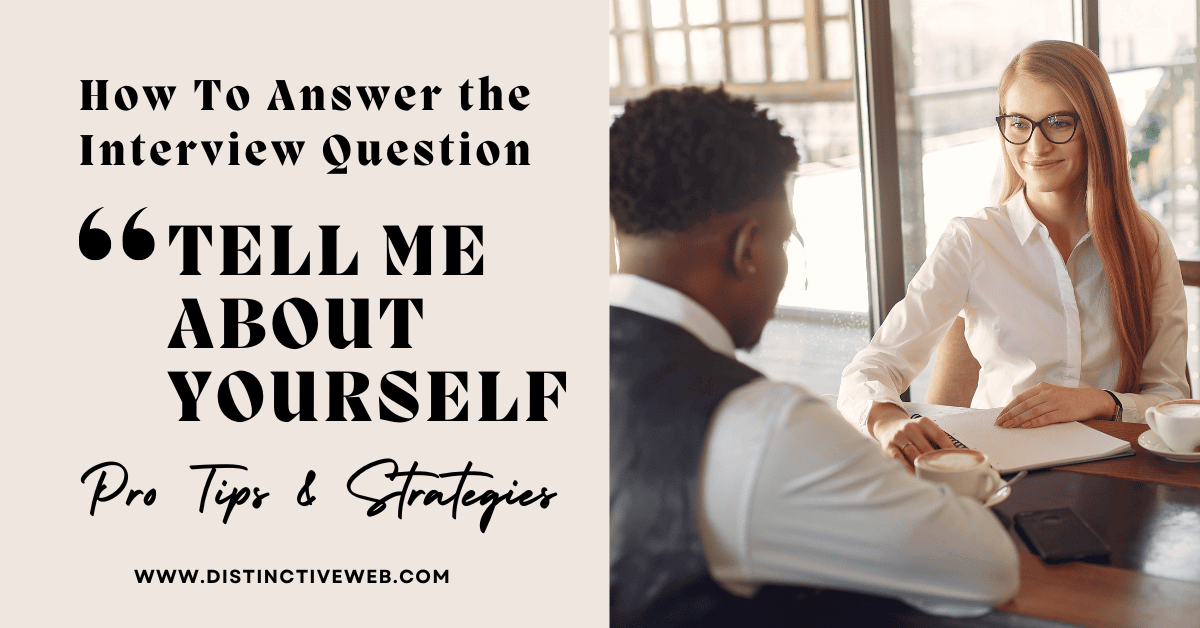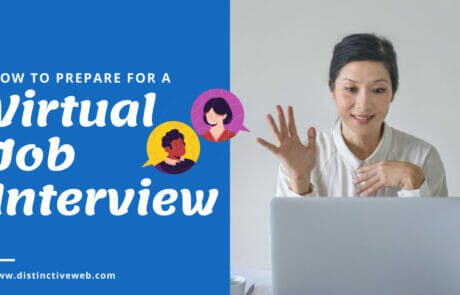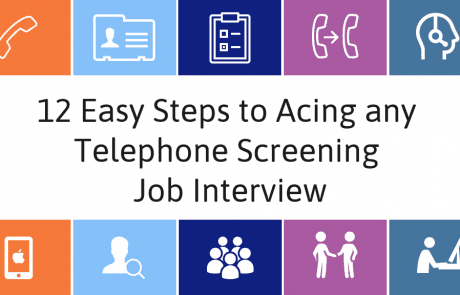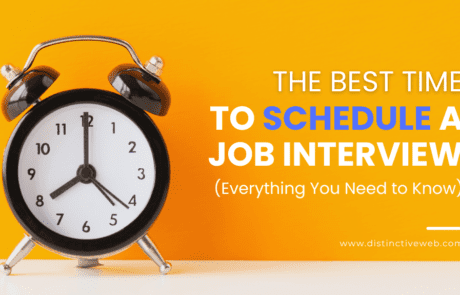
So you’ve finally landed that interview for that job you’re dying to get. Or maybe you have an informational interview lined up or will be attending a networking event next week.
You’ve researched the industry, and the company, confirmed that your references will provide glowing recommendations, and prepared a list of questions you’ll ask when given the opportunity.
Important as all those things are, success is likely to be beyond your reach if you don’t effectively handle a question asked in almost every interview and other job search situation you encounter: “Tell me about yourself.”
Many job sekeers find this question challenging because they simply don’t know what to say or how to answer this question. Some people find this question challenging because they don’t like to talk about themselves. While others have no problem telling others their personal story. Unfortunately, the career story they want to tell usually isn’t one the interviewer wants to hear.
Crafting your ‘tell me about yourself’ response is about more than reciting your resume.
This guide cuts to the chase with effective methods to build an engaging story that fits the job you’re eyeing. Learn to confidently blend your background, skills, and aspirations in a way that resonates with your interviewer’s needs—setting the stage for a successful interview.
Key Takeaways
- Perfect your introduction (aka elevator pitch) by establishing yourself as the solution to the company’s needs while connecting your past achievements and future aspirations with the role.
- Construct a strategic narrative that covers your essential professional identity, key attributes aligned with the role, and the synergy between your career goals and the company’s mission.
- Avoid common pitfalls by not merely reciting your resume, keeping your job history relevant to the position, and delivering your answer with a balance of preparation and authenticity.
Remember Why You Are There
In the theater of the job interview, the spotlight is on you the moment you hear “Tell me about yourself.”
You’re not just sharing a slice of your life story; you’re answering an unspoken question: “Are you the solution to our problem?” Your resume has already introduced your qualifications; now it’s time to distinguish yourself from the crowd and as the solution to the asker’s needs.

Crafting Your Opening Statement
The opening act of any good play is crucial, and your interview is no different. It sets the tone for what’s to come, grabbing the interviewer’s attention and leaving them eager to hear more. Your opening statement is your headline, your bold declaration of who you are in the professional realm.
It’s a blend of who you are, where you’ve been, and what you’ve accomplished—delivered with the brevity and punch of a tagline.
Begin With The Basics
Start with the backbone of your professional identity: your name and current role. Like any good introduction, it lays the groundwork for the narrative to follow. This is where you establish who you are in the context of the job you’re applying for, linking your past to your present, and laying out the key points that make sense for this chapter of your career.
Highlight Key Professional Attributes
Next, illuminate the core attributes that make you stand out as a candidate. What are the one or two defining qualities that you carry as your professional banner? These should resonate with the role at hand, be it your knack for innovation, your leadership prowess, or your exceptional ability to negotiate.
This is your chance to shine a light on what makes you unequivocally the right fit for the position.
Connect with the Company’s Mission
But don’t stop there. Weave in how your career goals harmonize with the company’s mission. Communicate that your ambitions aren’t just aligned with your personal growth but also with the business goals and values of the company. This creates a compelling case for why you’re not just looking for any job—but this job.
Structuring Your Response: A Strategic Approach
As you delve into the heart of your “tell me about yourself” response, think of it as a strategic narrative arc. Your goal is to guide the interviewer through a succinct story of your career progression, from your past achievements to your current capabilities and future aspirations.
This approach not only maintains interest but also showcases your understanding of the role and how your experience aligns with the company’s values.
Past Achievements
Begin with the milestones that have defined your journey. Recounting past achievements for a previous employer provides a historical context for your capabilities. Speak to the projects where you led the charge, the initiatives that bore your signature, and the results that you were instrumental in achieving. This isn’t just a highlight reel but a testament to the depth and breadth of your professional life.
Current Capabilities
Shift the focus to the present. What is it about your current position or role that sets the stage for your next career move? Are you shepherding major national healthcare brands, crafting intricate data analyses, or managing a top-performing team? Illustrate how your current role weaves into the fabric of your career path, demonstrating adaptability and a commitment to continuous professional development.
Future Aspirations
Finally, cast your gaze forward. Where do you see your career path heading, and how does this potential employer fit into that vision? Articulate how the job aligns with your broader career goals, whether it’s paving the way for a career change or propelling you towards new professional heights during your job search. A career coach can be a valuable resource in this process.
Your ability to envision a future with the company speaks volumes about your investment in the role and your potential for long-term contribution.

Showcasing Your Fit for the Role
Your story needs to resonate with the specific role you’re aiming for. Every chapter of your career should contribute to a cohesive narrative that demonstrates your suitability for the position. This isn’t just about what you’ve done but how what you’ve done has prepared you for this particular job. It’s about relevance, alignment, and the unique blend of skills that you bring to the table.
Relevance of Technical Skills
Dive into the technical know-how that you’ve honed over the years. Whether it’s your proficiency in computer science or your expertise in account management, discuss the hard skills that are directly relevant to the job. Use concrete examples to illustrate how you’ve applied these skills effectively, perhaps by streamlining a process, spearheading a successful project, or mastering new technologies. This is where you prove you’re not just capable but also adaptable.
Soft Skills That Set You Apart
But your technical prowess is only one part of the equation. Transferable soft skills like communication, teamwork, and problem-solving often set top candidates apart. Reflect on the moments where these skills have elevated your work, whether it’s through leading a team to victory or navigating through complex negotiations.
These personal attributes are the intangible yet invaluable assets that can truly differentiate you to a hiring manager in a sea of similarly qualified job seekers.
Adaptability to Different Industries
Then there’s your ability to adapt—to different roles, different industries, different cultures. Share experiences that showcase how you’ve thrived in varied environments, whether you’ve switched from academia to industry, worked internationally, or transitioned between fields. This adaptability speaks to a robust skill set and a versatile mindset, qualities that are highly valued in today’s dynamic job market.

Personal Touches Without Oversharing
While professional qualifications are paramount, the ‘tell me about yourself’ question also provides space for you to humanize your application throughout the hiring process. It’s about striking a balance—offering a glimpse into your personality and values without veering into the territory of overly personal details.
This is your opportunity to connect with the interviewer on a human level, to be memorable for all the right reasons, and prepare for your next interview.
Include a Personal Anecdote
Consider sharing a personal anecdote that casts a light on your character and complements your professional narrative. Maybe it’s a tale of a challenge you faced and overcame or an experience that ignited your passion for your field. Such stories can reveal much about your problem-solving ability, perseverance, and creativity.
Remember, the goal is to be relatable and engaging, not to recount your entire life story.
Boundaries to Maintain
However, be mindful of the boundaries. Personal does not mean private. Keep the focus on experiences that are relevant to the job or that demonstrate qualities sought in a candidate. Steer clear of details about your family, marital status, or any other personal matters that don’t pertain to your ability to excel in the role.
The key is to keep it professional while still showcasing your individuality.
Engaging the Interviewer
Engagement is crucial. You want the interviewer to feel like they’re having a conversation, not conducting an interrogation. Tailor your response to spark interest, perhaps by drawing parallels between your experience and the company’s mission or by expressing sincere enthusiasm for the opportunity at hand.
By doing so, you pave the way for a dynamic exchange that keeps the interviewer invested in your story.
Sample Answers
Scripting how you will answer the “tell me about yourself” interview question is smart. Doing so will help you stay focused because you will have to be brief; an overly detailed story about who you are becomes less interesting the longer you tell it.
Job seekers are well advised to be prepared for multiple scenarios. Try scripting sample answers that are varying lengths and include different amounts of detail. For example, three versions: one that would take you about two minutes to speak, one that would take you no more than 60 seconds, and a third that you can recount in 30 seconds or less. The following is an example of this in practice. These scripts are for an individual marketing professional, but the same model structure could be used for any profession.
Two-Minute Sample Answer
“Thank you for this opportunity. I’m a marketing professional with over 10 years of experience, specializing in digital marketing strategies and brand management. My journey started with a Bachelor’s degree in Marketing from XYZ University, where I graduated top of my class. This solid foundation propelled me into the marketing world, where I first worked with ABC Corp, a leading consumer goods company. There, I led a team that successfully increased online engagement by 40% over two years through innovative social media campaigns.
After honing my skills in digital marketing, I transitioned to DEF Technologies, an emerging tech startup, where I was challenged to build their brand from the ground up. My strategies contributed to a 25% increase in brand awareness and a 35% growth in sales within the first year. This experience taught me the importance of adaptability and creative problem-solving in a fast-paced environment.
Aside from my professional life, I’m passionate about photography and sustainable living, which allows me to bring creativity and a fresh perspective to my work. I’m excited about the opportunity to bring my blend of experience, skill, and passion to your team, contributing to innovative projects and driving growth.”
60-Second Sample Answer
“I’m a seasoned marketing professional with over a decade of previous experience in digital marketing and brand management. My career began with a Bachelor’s degree in Marketing from XYZ University, leading me to roles that have continuously challenged and honed my skills. At ABC Corp, I led a team to a 40% increase in online engagement through targeted social media campaigns. Later, at DEF Technologies, I spearheaded marketing strategies that boosted brand awareness by 25% and sales by 35% in just one year. Beyond work, I’m passionate about photography and sustainable living, which inspire creativity in my professional projects. I’m eager to leverage my experience and passion to drive growth and innovation in your team.”
30-Second Sample Answer
“As a marketing professional with 10 years of experience, I specialize in elevating brand presence and sales through innovative digital strategies. My work has significantly increased online engagement and sales for companies like ABC Corp and DEF Technologies. With a strong foundation in marketing from XYZ University, and a personal passion for creativity and sustainability, I’m ready to contribute to your team’s success with fresh, impactful marketing initiatives.”
These examples show how to effectively condense your professional story by focusing on the most compelling and relevant achievements, skills, and personal qualities, tailored to the audience’s interest and the time available.

Common Pitfalls to Avoid in Your Answer
Navigating the ‘tell me about yourself’ question is as much about what you include as what you leave out. There are common pitfalls that can trip up even the most seasoned professionals. Awareness of these traps can help you craft a response that is both compelling and concise, avoiding detours that could detract from your narrative.
Steer Clear of Reciting Your Resume
First, resist the urge to recite your resume. The interviewer has already reviewed your credentials; this question is an invitation to provide color and context to your resume. Use this time to show the person behind the accomplishments, to share the “why” and the “how” of your career journey, not just the “what.”
Bypass Irrelevant Job History
Next, be strategic about which parts of your job history you highlight. Focus on experiences that have direct relevance to the current job you’re applying for. Diverging into unrelated roles or outdated skills can muddy your narrative and leave the interviewer questioning your fit for the role.
Stay on track, and keep your story pertinent and powerful.
Prevent Rambling
Finally, avoid rambling. It’s easy to get carried away when talking about oneself, but brevity is the soul of wit—and of a successful interview response. Be succinct, offering just enough to pique the interviewer’s interest and invite further inquiry.
A concise answer demonstrates that you value the interviewer’s time and can communicate efficiently, two highly desirable qualities in any candidate.
Tailoring Your Tale to the Audience
Just as a storyteller knows their audience, you must tailor your tale to the interviewer. This means understanding the company’s culture, business goals, and the specifics of the role, and then calibrating your narrative to resonate with those parameters. This customization demonstrates that you’re not just looking for any job—you’re seeking this job, at this company, at this moment.
Reading the Room
Being perceptive to the interviewer’s reactions is key. Reading the room allows you to adjust your delivery in real-time, whether that means elaborating on a point that’s piqued interest or wrapping up a response that’s met with distracted glances. This attentiveness not only shows emotional intelligence but also ensures that your message is landing as intended.
Matching the Company Culture
Your narrative should also reflect the company culture. If collaboration is prized, emphasize your teamwork experiences. If innovation drives the business, discuss how you’ve pushed boundaries in your field.
By mirroring the company’s values in your story, you signal that you’re not just a fit for the job but also for the environment and ethos of the organization.
Addressing the Job’s Specific Requirements
It’s also crucial to align your answer with the job’s specific requirements. Use the job description as a guide to highlight experiences that directly address the competencies and skills sought. This shows the hiring manager that you understand what the job entails and are ready to hit the ground running.
Your goal is to leave no doubt that your past experiences have not only prepared you for this role but have uniquely positioned you to excel in it.

Fine-Tuning Your Delivery
How you deliver your answer can be just as important as the content. The nuances of your delivery can make the difference between a forgettable answer and one that sticks with the interviewer long after you’ve left the room. It’s about finding that sweet spot between rehearsed and spontaneous, ensuring your delivery is:
- Polished
- Engaging
- Authentic
- Confident
But not robotic.
Practice Without Over-Preparing
Scripting your answer to this and other common interview questions is helpful; so is practicing your delivery with a family member or career coach. Yet, while practice makes perfect, over-preparation can lead to a stiff, monotonous delivery. Aim for a conversational tone that flows naturally. Practice your key points but leave room for flexibility. This way, you’re prepared for the questions that come your way without sounding like you’re reading from a teleprompter.
Engaging in mock interviews with an interview coach and receiving feedback can help refine your delivery to strike the right balance between preparedness and spontaneity.
Verbal and Non-Verbal Communication
Your verbal and non-verbal (body language) cues play a significant role in how your message is received. Here are some tips to keep in mind:
- Maintain eye contact to demonstrate confidence.
- Use gestures to underscore points but keep them measured and purposeful.
- Modulate your voice to convey enthusiasm.
- Don’t be afraid to pause for emphasis.
These subtle cues can significantly enhance the impact of your narrative.
Asking Follow-Up Questions
Engage the interviewer further by inviting them into the conversation. Posing thoughtful follow-up questions at the end of your response can turn the one-sided monologue into a dialogue. Inquire about the company’s challenges, the team’s dynamics, or the role’s potential growth.
This not only shows you’re interested in the position but also gives you additional insights that might aid in your final pitch for the job to hiring managers.
Translating Your Answer into Opportunities
The ultimate goal of your ‘tell me about yourself’ answer is to set the stage for the rest of the interview. It should be a springboard into deeper discussions about your qualifications and fit for the role. Done well, it can turn a routine question into a golden opportunity to:
- showcase your skills and experience
- highlight your achievements
- demonstrate your passion and enthusiasm for the role
- make a memorable impression on the interviewer
By crafting a compelling and concise response, you can effectively position yourself as the ideal candidate for the job.
Pivot Points for Further Discussion
Create natural pivot points in your answer that invite further discussion. For example, briefly mention a project that aligns with the company’s current needs or a skill that’s particularly relevant to the position. This gives the interviewer an opening to ask more about your experience, allowing you to expand on your qualifications in a way that’s directly relevant to the job.
Expressing Genuine Interest
Show that you’re not just interested in a job—you’re interested in this job. Speak passionately about the role and the company, which can be infectious and memorable. This genuine enthusiasm demonstrates that you’ve invested time in understanding the company and that you’re excited about the prospect of contributing to its success.
Inviting Questions About Your Experience
Encourage the interviewer to delve deeper into your experience by crafting your answer as an invitation to an important interview question. Suggest areas where you’re particularly proud or where you think your experience could be an asset to the team. By doing so, you’re not only providing them with a roadmap to your professional and academic background, but also signaling your openness and eagerness to discuss your fit for the role in greater detail.
Final Thoughts
As you can see, mastering the ‘Tell me about yourself’ interview question is about articulating a narrative that’s coherent, compelling, and complete. It’s about understanding the context, connecting with your audience, and conveying your professional background and story in a way that’s both memorable and relevant. With strategic preparation and genuine enthusiasm, you can transform this common interview question from a hurdle into a highlight, paving the way for a successful interview and, ultimately, the job you’re aiming for.
Frequently Asked Questions
What is the best answer for 'Tell me about yourself' when job searching?
The best way to answer “Tell me about yourself” is to provide a brief highlight of your experience, education, and the value you can bring to the employer, along with expressing your interest in learning more about the job and working with the company. Consider the following structure: Start with your professional background: Give a brief overview of your career path. Highlight key achievements: Focus on accomplishments that are relevant to the position you’re applying for. Mention your skills: Emphasize the skills that make you unique and a good fit for the job. Add a personal touch: Share a bit about your passions or interests that align with the company’s values or culture. Conclude with your current situation: Why you’re excited about the opportunity and how you see yourself contributing. Keep the tone of your voice positive and enthusiastic, and be mindful that your body language aligns. Remember, practice is key to delivering these responses smoothly and confidently. Tailor each version to the specific audience and setting, ensuring your answer is relevant and impactful.
How should I introduce myself in an interview?
Begin the interview by clearly stating your name. Then share a brief overview of your professional background, mentioning your current role, highlighting a few key achievements or experiences, and concluding with why you’re excited about the opportunity to interview. Keep your introduction relevant to the job you’re applying for. Always express gratitude for the opportunity to interview and maintain a natural conversational tone.
How long should my 'Tell me about yourself' answer be?
Your answer should be around 1-2 minutes long. It’s important to be concise but informative, covering key points without dragging on too long. Consider preparing three flexible scripts for answering this interview question: one approximately two minutes long, one 60 seconds long, and one 30 seconds long. Rehearse your answer to ensure it sounds natural and stays within the desired length.
Can I include personal interests in my 'Tell me about yourself' answer?
Yes, you can include personal interests, especially if they relate to the job or demonstrate skills important for the role. Just make sure to keep this part brief, interesting to the listener, relevant, and appropriate. First impressions play a significant role in a job search, and sharing fun facts about yourself is a great way to make a memorable impression.
Is an elevator pitch the same as answering the question 'Tell me about yourself'?
Yes, they can be very similar. Your elevator pitch is essentially a short, compelling summary of who you are professionally, including your background, skills, and why you’re a good fit for the job, which aligns with how you should answer “Tell me about yourself.”
How to answer 'Tell me about yourself' if I have no experience?
If you are looking for your first job and have no employment experience, focus on your education, any relevant coursework or projects, volunteer work, and transferable skills that apply to the job. Emphasize your enthusiasm for the field and your eagerness to learn and grow in the role.
What do employers want to hear when they ask 'tell me about yourself'?
Many employers use this question to gauge a candidate’s goals, as well as to assess their confidence. Employers are also seeking to see how your experiences and skills make you a good fit for the position. They want to hear about your professional journey, key accomplishments, and how your background aligns with the job’s requirements. The person interviewing you has been tasked with assessing whether you can do the job. “Tell me about yourself” may be what you hear. “Are you the solution to our problem?” is what you’re really being asked.
Why is the 'Tell me about yourself' question important in interviews?
This question gives you the chance to set the tone for the interview and highlight your most relevant achievements and experiences. It’s an opportunity to make a strong first impression and show why you’re the best candidate.
How can I make my 'Tell me about yourself' answer stand out?
Personalize your answer with a unique story or experience that demonstrates your skills or character. Use specific examples of your achievements and how they’ve prepared you for the role you’re interviewing for.








